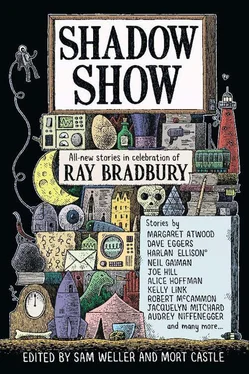“We’re not looking to indict your son necessarily, Joe. We know what he’s capable of.” The pause between the governor’s words were clips of hurried breath. “We think we know what he was intending in his messages. Correction is all that we’re after. Correction and rectification.”
Joseph laughed and shrugged at once. “Before last week, I hadn’t heard that word terrorist since I was a boy. Since my father—”
“You will lead us to him, then?” Westgrove’s withered hand reached toward her projector’s power button. “Think of this administration as extended family, and connecting us to your son as our collective intervention.”
“Everything ends in -tion , -ive , or -ist to you. Words mean more when they’re longer? Is that a rule, Governor?” He chuckled at the pallid gray woman. “So, we’re family: I should call you Big Mother Governor?”
“ Sister, just sister, Joe, my brother. History is behind us. This is for the best.”
Westgrove’s faces disappeared from Reagan Square’s skyline, and the center returned to its soft silver nighttime haze. Joseph climbed the municipal safety ladder, stopping at the fifth of two dozen rungs, just high enough to take hold of the water hose, and he looked up at the blue graffiti marking the commodities building. From that height, the circles appeared drawn in letters that spoke through fresh cracks in the building edifice. Each spiral painted in turning phrases, repeating their vandalism on the skyscraper’s alley side—REVOLUTION TURNS, BACK TO THE BEGINNING, THE ONLY WAY, SANS CHANGE, VIVA CHEVY—flushing into empty tile before repeating from the first.
About “Reservation 2020”
“Reservation 2020” wells up from themes treated in Ray Bradbury’s longer works, Fahrenheit 451 and Something Wicked This Way Comes in particular. I read Fahrenheit as using its futuristic landscape to comment on profound social change observed in the America (United States) in which Bradbury crafted the novel—change wrought by post–World War II technological advancement, the altered political climate partially born from that advance, and the presumptuous winds of progress blowing all about the author’s hinterland home. While Fahrenheit looks forward in time with wary eyes, Something Wicked looks back to childhood through a nostalgic lens cast upon an idyllic place no longer to be, both within the context of that novel and within the author’s own living narrative: Bradbury’s prose had taken up Green Town before Something Wicked , and he would come back to that place of lost innocence again. On each fictive visit, the plates beneath the village’s reality had shifted.
Essential to Ray Bradbury’s fiction are his love for the beauty of words and his recognition of history’s prevailing sway. The horror at the core of Fahrenheit 451 seems to me the human tragedy had when words bound by historic context smolder in readerless ruins at a bonfire set by those appointed to safeguard social progress. How could Bradbury the writer not ponder the coming of such a future as he beheld the beginning and end of all-out wars, the expediting of life all about him, and the arrival of the graphic babble-box screen in just about every living room in every village strewn across the landscape that he called home?
Today Ray Bradbury seems a prophet, foretelling a time in which the narrative of change is told not in books but in clipped tweets, ticker tapes, and graffiti blurbs, reiterated ad nauseam by plasma-screen heads spouting words ripped of meaning. At his finest, the author uses poignant language and foreboding setting to warn of this carnival lurking at the edge of town.
—Bayo Ojikutu
Soft music woke the sleepers in the spaceship The House of Secrets . They opened their eyes to soft pink light, crept like vampires from their narrow beds. They gathered in the antechamber. Outside the world was night, the dawn a hundred years away.
The sleepers floated gracelessly in the recycled air, bumped softly against one another. They clasped hands, as if to reassure one another that they were real, then pushed off again. Their heads were heavy with dreams. There were three of them, two women and one man.
There was the ship as well. Her name was Maureen. She was monitoring the risen sleepers, their heart rates, the dilation of their pupils, each flare of their nostrils.
“Maureen, you goddess! Bread, fresh from the oven! Sourdough!” Gwenda said. “Oh, and old books. A library? It was in a library that I decided I would go to space one day. I was twelve.”
They inhaled. Stretched, then slowly somersaulted.
“Something brackish,” said Sullivan. “A tidal smell. Mangrove roots washed by the sea. I spent a summer in a place like that. Arrived with one girl and left with her sister.”
“Oranges, now. A whole grove of orange trees, all warm from the sun, and someone’s just picked one. I can smell the peel, coming away.” That was Mei. “Oh, and coffee! With cinnamon in it!”
“Maureen?” said Gwenda. “Who else is awake?”
There were twelve aboard The House of Secrets . Ten women and one man, and the ship, Maureen. It was a bit like a girls’ summer camp, Gwenda had said, early on. Aune said, Or an asylum.
They were fourteen years into their mission. They had longer still to go.
“Portia is awake, and Aune, and Sisi,” Maureen said. “For two months now. Aune and Portia will go back to sleep in a day or two. Sisi has agreed to stay awake awhile yet. She wants to see Gwenda. They’re all in the Great Room. They’re throwing a surprise party for you.”
There was always a surprise party. Sullivan said, “I’ll go and put my best surprised face on.”
They threw off sleep. Each rose or sank toward the curved bulkhead, opened cunning drawers and disappeared into them to make their toilets, to be poked and prodded and examined and massaged. The smell of cinnamon went away. The pink light grew brighter.
Long-limbed Sisi poked her head into the antechamber and waited until Gwenda swung out of a drawer. “Has Maureen told you?” Sisi said.
“Told what?” Gwenda said. Her hair and her eyebrows had grown back in her sleep.
“Never mind,” Sisi said. She looked older; thinner. “Dinner first, then all the gossip.”
Gwenda wriggled through the air toward her, leaned her face against Sisi’s neck. “Howdy, stranger.” She’d checked the ship log while making her toilet. The date was March 12, 2073. It had been two years since she’d last been awake with her good friend Sisi.
“Is that a new tattoo?” Sisi said.
It was an old joke between them.
Head to toes Gwenda was covered in the most extraordinary pictures. A sunflower, a phoenix, a star map, and a whole pack of wolves running across the ice. There was a man holding a baby, a young girl with red hair on a playground rocket, the Statue of Liberty and the state flag of Illinois, passages from the Book of Revelations, and a hundred other things as well. There was the ship The House of Secrets on the back of one hand, and its sister, The House of Mystery , on the other. You only told them apart by the legend scrolled beneath each tattoo.
You didn’t get to take much with you when you went into space. Maureen could upload all of your music, all of your books and movies, letters and videos and photographs of your family, but how real was any of that? What of it had any weight? What could you hold in your hand? Sisi had a tarot deck. Her mother had given it to her. Sullivan had a copy of Moby-Dick , and Portia had a four-carat diamond in a platinum setting. Mei had her knitting needles.
Читать дальше



![Lord Weller - Ритера или опасная любовь [СИ]](/books/421202/lord-weller-ritera-ili-opasnaya-lyubov-si-thumb.webp)








